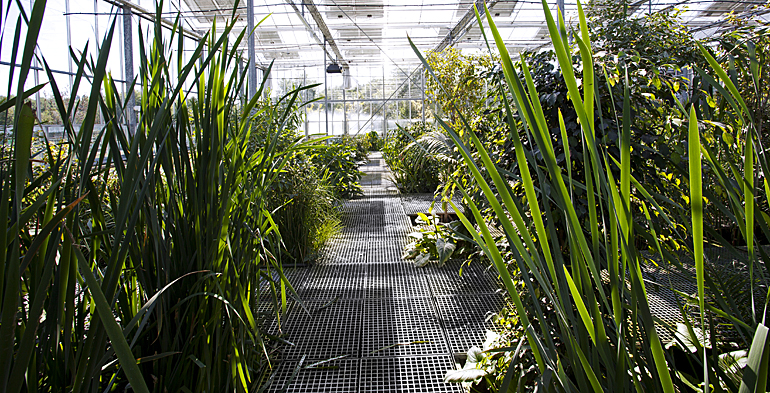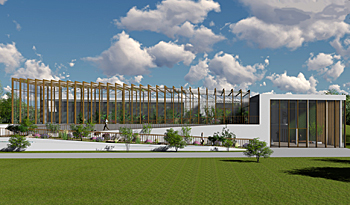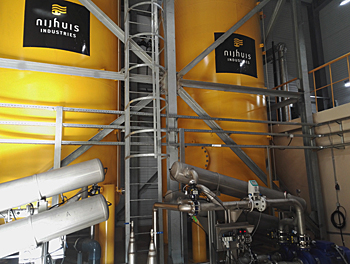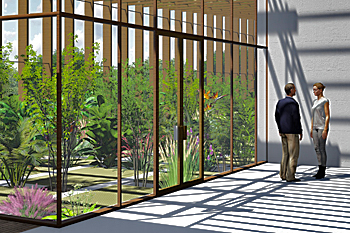Nijhuis to build botanical garden waste water treatment plant in Russia
 Water technology firm Nijhuis Industries is to build the largest industrialized botanical garden waste water treatment plant for a shopping centre in Russia.
Water technology firm Nijhuis Industries is to build the largest industrialized botanical garden waste water treatment plant for a shopping centre in Russia.
A Food Chain Reactor (FCR) will be incorporated in a turn-key 1,000 m3/d treatment facility with pre- and post-treatment by Nijhuis, including advanced technologies to purify water into river discharge quality.
The FCR-reactor will be built together with technology partner Organica Water.
 The wwtp combines the look of a botanical garden and the efficient treatment of waste water
The wwtp combines the look of a botanical garden and the efficient treatment of waste water
Integrated design
The new botanical wastewater treatment plant, which operates without any odor and boasts beautiful flora and fauna, is situated in a glass house. It ensures seamless integration of the treatment facility in the urban area with the shopping center complex, including a botanical garden visitors' center.
The pre-treatment solution is executed with Nijhuis screening and Dissolved Air Flotation (DAF) units and will remove the large particles from the wastewater prior to entering the Organica FCR-reactor.
After the secondary treatment through the FCR, CarboPure (CP) and UV disinfection units (NUV) will polish the effluent to Russian discharge requirements.
The excess sludge will be treated with a Drum Filter (NDF) and Screw Press (NSP).
 One of the additonal elements to be able to meet the discharge requirements is this CarboPure system
One of the additonal elements to be able to meet the discharge requirements is this CarboPure system
Smart use of active biofilms
The use of a botanical garden as wastewater treatment is highly creative. The garden facility utilizes active biofilms on natural or engineered root structures (biomodules), all in a fully-enclosed facility.
As a result, the physical footprint of the treatment plant is significantly reduced, and operational and infrastructural costs are lower in comparison with conventional solutions.
The biological reactors are arranged in a cascade configuration, each with specially designed biomodules, in order to optimize the development of distinct ecosystems in each step of the treatment process.
As a result of this design, the composition of the ecosystem changes from reactor to reactor, adapting itself to the decreasing nutrient concentrations, and thus maximizing the decomposition of contaminants.
 Its attractive look and odorless treatment allows the wwtp to be located anywhere
Its attractive look and odorless treatment allows the wwtp to be located anywhere
Compact, odorless and garden-like facility
The botanical garden turns the idea of the current massive concrete and smelly waste water treatment plants upside-down.
The new concept offers a compact, odorless, garden-like facility which produces a high-quality, reusable effluent.
The attractive look and feel of the botanical garden solution further enhances this, as the facility can be used not just as a wwtp but also a scientific, educational, and recreational space. This makes it possible to locate it virtually anywhere, which is why the concept was chosen for this critical project.
Most efficient treatment
The FCR technology has been developed by Organica Water. This company’s management is based in the USA, with an engineering and R&D hub in Hungary.
All waste water treatment solutions offered by Organica are founded on the fundamental belief that nature provides the most efficient means to treat waste water, offering significant cost savings compared to other solutions, and harmonious integration into modern urban lifestyles.
This news item was originally published on the website of Nijhuis Industries.
Read also on this website
● Nijhuis Industries awarded construction large industrial wwtp in Port Said, Egypt, 10 November 2017
● Nijhuis Industries installs modular wastewater solution in record period of time, 19 October 2017
● Expertise: Water technology
● Country: Russia
More information
Nijhuis Industries
Doetinchem, the Netherlands
+31 314 749 000
www.nijhuisindustries.com
3D impression of the new botanical waste water treatment plant



